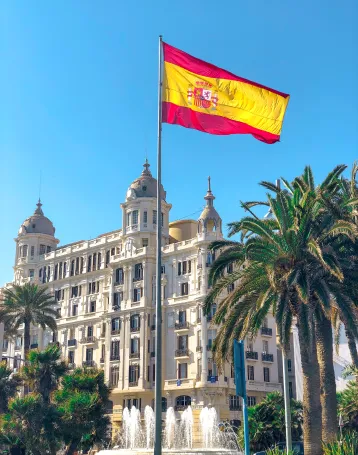
Crypto License in Spain
Last Update: 13.11.2025
Spain is among the key players in the world of crypto assets and the actively developing digital technology sphere. As of 2020, 88 crypto startups were already operating there. Spain ranks 4th in the EU in terms of the number of crypto asset owners. Our team will provide you with full support and accompaniment in opening a crypto license in Spain with guaranteed results.
To legally operate a cryptocurrency business, register with the Bank of Spain as a VASP and apply for a cryptocurrency exchange license.
To get a positive response from the regulator, you need to fulfill several rules, formalize as a legal entity, have a physical office, develop a business plan, and so on. It is also necessary to comply with AML regulations, as the Spanish government is concerned about the risks of misuse of crypto assets and takes compliance with these regulations seriously.
Businesses holding crypto licenses in Spain can provide services for operations with crypto assets and their storage. At the same time, their activities do not belong to that characteristic of the banking sector, electronic money creators, or investment funds.

Find more information about the Spanish crypto license
List of capabilities for VASP registered in Spain
Virtual currency exchange:
Registered VASPs can exchange various types of crypto assets for fiat currency and vice versa, as well as exchange one type of cryptocurrency for another.
Providing storage services:
Companies with a Spain Crypto License can provide storage services for virtual assets for their clients, ensuring safe and secure storage of digital assets.
Participation in investment projects:
Registered VASPs can provide access to investment projects and funds related to crypto assets.
Integration with technology platforms:
Registered VASPs can develop and integrate their technology solutions to ensure secure and efficient transactions.

Request more information about the Spanish crypto license
Requirements for a crypto license in Spain
To open a crypto license in Spain, the following requirements must be met:
- Register with the SCB (Spanish Central Bank Registry);
- Register SL (Sociedad Limitada) – a legal entity, the Spanish equivalent of LLC (Limited Liability Company);
- Apply for a crypto license in Spain;
- Purchase or rent a physical office in Spain;
- All beneficiaries must have an impeccable reputation;
- Develop a realistic business plan that includes a strategy, a list of platforms, and how to secure clients and protect them;
- Open a bank account and obtain financial approval from the Central Bank of Spain;
- Employ staff with experience in the field (incl. AML Officer);
- Strictly comply with AML regulations.
Registration of a crypto company in Spain
For entrepreneurs wishing to register their cryptocurrency business in Spain, there are several important steps:
- Choosing the type of company
The first step is to choose the most appropriate type of company according to your planned activity. There are several forms of companies in Spain, including Sociedad Limitada (SL), Sociedad Anónima (SA), and others. Each form has its characteristics and rules. For cryptocurrency activities, you should choose Sociedad Limitada.
- Obtaining a certificate in the name of the company:
After selecting the type of company, you should request a unique name for your company. This name will be used later on to formalize and identify the company.
- Paperwork:
You should prepare all the mandatory documents for setting up a company, including the articles of incorporation. The documents should be executed before a notary public to ensure that they are legal and legitimate.
List of documents:
- Corporate Documents
- Registration form for foreign exchange service providers
- Evaluation questionnaires for the applicant legal entity and separately for each effective manager, signed by each party
- Company guidelines for anti-money laundering and countering the sponsorship of terrorism, as well as protocols in this area
- Risk analysis document.
- Registration of the company with the Commercial Register:
The next step is to register the company with the Commercial Register (Registro Mercantil).
- Registration of Taxpayer Identification Number:
Every business in Spain must have its unique taxpayer identification number (NIF). This number is required for tax registration and identification with the tax authorities.
Crypto license lawyers in Spain

Position
Senior Associate, Business Development Manager (Crypto & Blockchain)Phone
+372 602 8423
Position
Senior Associate, Chief Coordination OfficerPhone
+372 602 8423Overview of Crypto Regulation in Spain
| Project time frames | 5 to 6 months |
| State fee for application | 0€ |
| Required share capital | 1€ |
| Corporate income tax | 15% for the first 2 years of company being taxed and 25% afterwards |
| Annual supervision fee | 0€ |
| Local staff member | Local AML Officer |
| Physical office | Required |
| Accounting audit | Not required |
| Sustainability | Sustainable |
| Bank account options | European EMIs |
Cryptocurrency Regulations in Spain
At the moment there is no specific Crypto Regulation in Spain. It is important to note that cryptocurrencies are not recognized as legal tender and this status only applies to the euro as national currency under Law 46/1998 of December 17.
On February 17, 2022, the Circular containing rules governing cryptocurrency advertising came into effect. According to the new rules, the regulation of cryptoasset advertising in Spain is subject to certain standards and requirements. It should be clarified that for large-scale advertising projects, the CNMV requires 10 working days’ notice. This advance notice must include all the details of the campaign, including dates, territory, and description. If this condition is not met, the CNMV may impose sanctions as stipulated by law. Violations of cryptoasset advertising regulations may result in fines, which depend on various factors such as advertising revenue and the scope of the violation.
On April 27, 2021, Royal Decree 7/2021 came into force, which confirmed the amendment of national laws relating to anti-money laundering and countering the sponsorship of terrorism, by the EU directive aimed at combating money laundering. These changes are aimed at the mandatory registration of cryptocurrency providers with the Bank of Spain. Following the decree, Spain began to follow the EU’s Anti-Money Laundering Directive 5 (AMLD5). These proposed amendments also strengthened Spain’s proactive measures in the fight against financial crime. These changes were made to national legislation following warning messages from the EU to amend its anti-money laundering measures.
On February 8, 2018, the Spanish stock market regulator (CNMV) introduced a fundamental communiqué aimed at controlling the intense cryptocurrency advertising, and the regulation in this area has become clearer. The proposal defines the status of cryptoassets as “a digital representation of assets or rights that are transferred or stored electronically using decentralized registry technologies or similar approaches” The bill is expected to come into force 3 months after its publication in the Spanish National Gazette (B.O.E.).
In addition, it is worth noting that blockchain technology, which enables the distribution of digital information without the possibility of copying, will be able to find mass application in the Spanish legal sphere. Until recently, only notaries were authorized to validate legal documents, but blockchain platforms will be able to provide an alternative mechanism for identifying legal assets. A recent example is BBVA, a large bank based on a blockchain platform with the possibility of syndicated financing.
Taxation of cryptocurrencies in Spain
In Spain, the use of digital assets is accompanied by the need to pay taxes on the profits made:
- Profit less than 6,000 EUR – the tax is 19%;
- For income between 6,000 and 50,000 EUR – the tax is 21%;
- If the income is more than 50,000 EUR – the tax is 23%.
Income from dividends and other types of participation in corporate property for non-residents is taxed at a flat tax rate of 19%.
In addition to purchase and sale transactions and dividends, cryptocurrency mining in Spain is also subject to taxation. Individuals or legal entities engaged in mining are required to register with the Spanish tax authorities.
In October 2019, the Law on Measures to Prevent Tax Fraud was passed. According to the law, it is necessary to notify the tax administration of their bitcoin, altcoin balances, and cryptocurrency transactions. In case of non-compliance with these requirements, a fine of 10,000 EUR is stipulated.
FAQ about crypto license in Spain
How to obtain a VASP license in Spain?
To obtain a crypto license in Spain, you first need to register with the SCB registry, register as SL (Sociedad Limitada), and apply for a license with the Bank of Spain.
How much does a crypto license cost in Spain?
The cost of a crypto License in Spain can vary and depends on many factors. On average, you can expect to pay around 15,000 to 20,000 euros.
Is cryptocurrency regulated in Spain?
As of 2023, there is no specific regulation of cryptocurrencies in Spain. At the same time, the government has outlined several rules for cryptocurrency companies that address the designation of crypto assets, advertising, taxation, and compliance with AML policies.
Is income from cryptocurrency taxed in Spain?
The amount of tax on income from crypto assets depends on the profit earned. The tax rate on income in Spain is from 19% to 23%. The tax on dividends for non-residents is 19%.
How to open a cryptocurrency company in Spain?
Establishing a cryptocurrency company in Spain requires choosing a specific type of organization, obtaining a certificate for its name, preparing the necessary documents under notarial supervision, registering with the Commercial Register, and issuing a taxpayer identification number. The review of the licensing application and issuance of the license is handled by the Bank of Spain.
Explore other Crypto Licences
Connect with our experts
Our experts will tell you how to do it as quickly and easily as possible.
By clicking the button, I confirm that I have read the privacy policy and consent to the collection and processing of my personal data in accordance with the GDPR rules.










